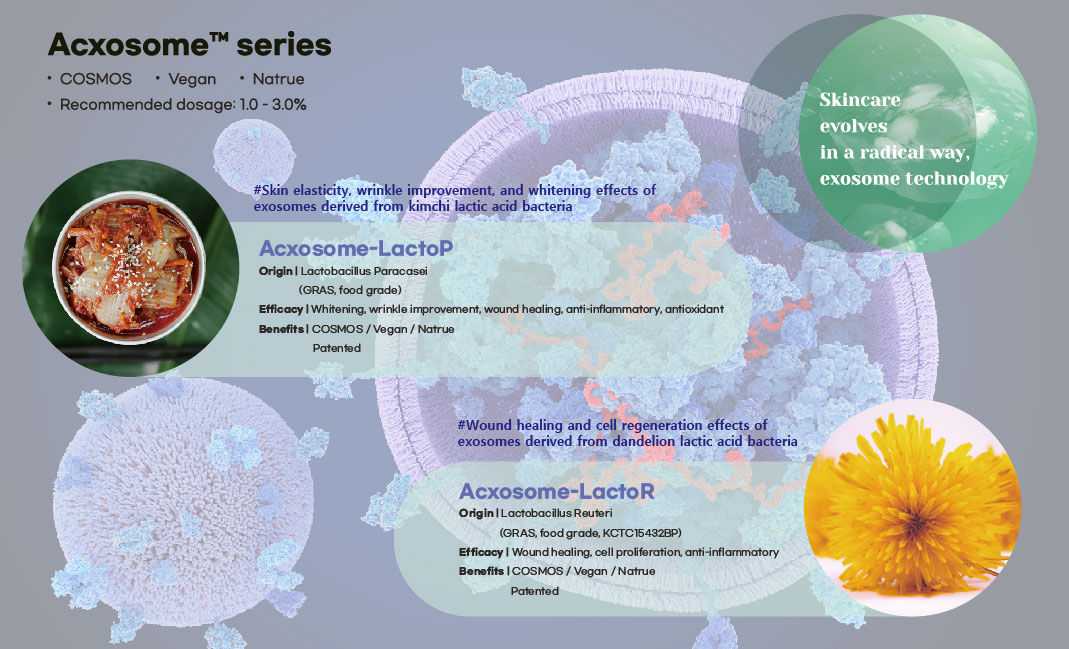Exosomes help transmit signals between cells and play a role in delivering specific effects to the skin. In particular, it contains various physiologically active substances that are helpful for skin health, such as anti-inflammatory, antioxidant, and moisturising effects, and has been developed as a cosmetic raw material using various derived substances such as stem cell culture medium, human lactic acid bacteria, and plant extracts such as fruits, vegetables, and flowers.
ACTIVON develops and produces exosomes derived from plant flora, which are extracted from beneficial microorganisms (mainly lactic acid bacteria) found in plants. Exosomes derived from plant-based lactic acid bacteria have high biocompatibility and are less irritating to the skin, making them an ideal cosmetic material for modern consumers looking for sustainable and eco-friendly skin care solutions.
What are plant-based lactic acid bacteria?
Plant-based lactic acid bacteria are a type of beneficial lactic acid bacteria naturally found in the leaves, stems, and roots of plants. They are part of the plant's microbial community (microbiome) and have a variety of effects, including promoting plant growth, inhibiting pathogens, and improving nutrient absorption.
Ease of production and sustainability of bacteria-derived exosomes
1. Sustainability of the production process
Bacteria grow easily in culture medium, and exosomes can be obtained from the culture medium produced during the culture process. This provides the possibility of upcycling to recover exosomes using “discarded” culture medium without additional resource loss.
2. Production cost
Bacteria can be mass-cultured at relatively low cost, and the process of recovering exosomes is also efficient. In particular, it can be used additionally in the existing culture industry (e.g. fermentation industry), so additional production costs are low.
3. Environmental benefits
It is sustainable because it can reduce waste and efficiently recycle resources by using the culture fluid discharged from the existing fermentation process.
4. Large-scale production potential
Bacteria are capable of rapid proliferation and mass culture, making them very suitable for large-scale exosome production.
5. Potential for application and research expansion
Bacteria-derived exosomes can be produced from various strains, making it possible to develop specialised exosomes depending on the purpose. By using specific strains, exosomes suitable for anti-inflammatory, antioxidant, or intestinal health improvement can be produced, and upcycled exosomes enable eco-friendly storytelling, which has a marketing advantage in the development of biohealth and cosmetic products.
We introduce two exosome raw materials derived from plant-based lactic acid bacteria. All of these products have been certified as vegan because they cultivated lactic acid bacteria using vegan media.

#Skin elasticity, wrinkle improvement, and whitening effects of exosomes derived from kimchi lactic acid bacteria
Lactobacillus Paracasei is found in dairy products as well as plants and has properties that promote gut health and help regulate immunity. It is also used in cosmetics for its skin soothing and moisturising effects. Acxosome-LactoP obtained from kimchi-derived lactic acid bacteria can improve overall skin condition through whitening, wrinkle improvement, anti-inflammatory, and antioxidant effects.
Acxosome-LactoP
Origin | Lactobacillus Paracasei (GRAS, food grade)
Efficacy | Whitening, wrinkle improvement, wound healing, anti-inflammatory, antioxidant
Benefits | COSMOS / Vegan / Natrue
Patented
#Wound healing and cell regeneration effects of exosomes derived from dandelion lactic acid bacteria
Lactobacillus Reuteri is a probiotic that has been shown to have many health benefits through long-term research, and is particularly effective in anti-inflammatory and wound healing. It is used as a very promising ingredient in skin care products aimed at improving inflammatory skin diseases and wound healing.
Acxosome-LactoR
Origin | Lactobacillus Reuteri (GRAS, food grade, KCTC15432BP)
Efficacy | Wound healing, cell proliferation, anti-inflammatory
Benefits | COSMOS / Vegan / Natrue

